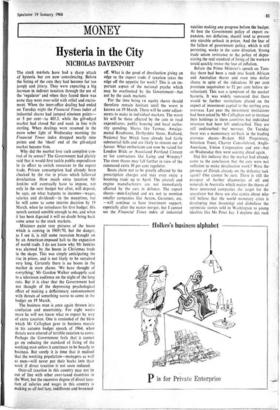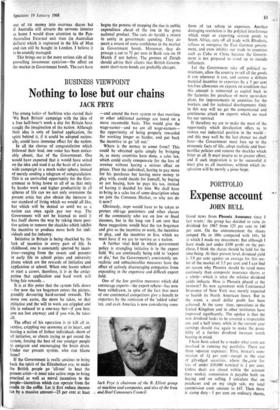Hysteria in the City MONEY
NICHOLAS DAVENPORT
The stock markets have had a sharp attack of hysteria but are now convalescing. Before the listing of the cuts they had become far too jumpl, and jittery. They were expecting a big increase in indirect taxation through the use of the 'regulator' and when they found there was none they went over-wild with relief and excite- ment. When the inter-office dealing had ended on Tuesday night the Financial Times index of industrial shares had jumped nineteen points— or 5 per cent—to 405.3, while the gilt-edged market had closed flat and weak in line with sterling. When dealings were resumed in the more sober light of Wednesday morning the Financial Times index dropped nearly nine points and the 'short' end of the gilt-edged market became firm.
Why did the market lose such complete con- trol of its senses? The Government had plainly said that it would first tackle public expenditure in its effort to switch resources to the export trade. Private consumption had already been checked by the rise in prices which followed devaluation. How much extra taxation Mr Jenkins will eventually have to impose, not only in the next budget but after, will depend, he says, on what happens to incomes—wages, salaries and dividends—in the meantime, but he will come to some interim decision by 19 March, when he introduces his first budget. His speech seemed sensible enough to me, and when it has been digested it will no doubt bring back some sense to the stock markets.
Ministers paint rosy pictures of the boom which is coming in 1969/70, but the danger, as I see it, is still some recession brought on by an American-imposed halt to the expansion of world trade. I do not know why Mr Jenkins was alarmed by the boom in Christmas trade in the shops. This was simply anticipating the rise in prices, and is not likely to be sustained very long. Certainly there is no boom in the market in store shares. 'We have thought of everything,' Mr Gordon Walker unhappily said to a television audience on the night of the long cuts. But it is clear that the Government had not thought of the depressing psychological effect of making a deflationary announcement with threats of something worse to come in the budget on 19 March.
The business man is once again thrown into confusion and uncertainty. For eight weeks more he will not know what to expect by way of extra taxation. One is reminded of the blow which Mr Callaghan gave to business morale in his autumn budget speech of 1964, when threats were uttered of terrible taxation to come. Perhaps the Government feels that it cannot go on reducing the standard of living of the working man unless it continues to be beastly to business. But surely it is time that it realised that the working population—managers as well as men—will never put their backs into their work if direct taxation is not soon reduced.
Over-all taxation in this country may not be out of line with other over-taxed Countries in the West, but the excessive degree of direct taxa- tion of salaries and wages in this country is making us all feel lazy, indifferent and browned- off. What is the good of devaluation giving an edge to the export trade if taxation takes the edge off the appetite for work? This is an im- portant aspect of the national psyche which may be overlooked by the Government—but not by the stock markets-.
For the time being UK equity shares should therefore remain hesitant until the worst is known on 19 March. There will be some adjust- ments to make in individual markets. The worst hit will be those affected by the cuts in road expenditures, public housing and local autho- rity spending. Shares like Tarmac, Amalga- mated Roadstone, Derbyshire Stone, Redland, National Star Mrick have already had fairly substantial falls and are likely to remain out of favour. What enthusiasm can now be raised for London Brick or Associated Portland Cement or for contractors like Laing and Wimpey? The store shares may fall further in view of the rumoured extra 10 per cent regulator.
Boots claim not to be greatly affected by the prescription charges and may even enjoy a booming trade up to April. The aircraft and engine manufacturers are not immediately affected by the cuts in defence. The export shares—maH-Leyland and tct, not to mention smaller companies like Acrow, Gestetner, etc. —will continue to have investment support, especially after the motor merger, but I cannot see the Financial Times index of industrial Pis for Private Enterprise
equities making any progress before the budget. At best the Government policy of export ex- pansion, not deflation, should tend to prevent any sizeable setback in prices. And the fear of the failure of government policy, which is still persisting, works in the same direction. Strong trade union resistance to the policy of depre- ciating the real standard of living of the workers could quickly revive the fear of inflation.
Before the Prime Minister's speech on Tues- day there had been a rush into South African and Australian shares and even into dollar shares in spite of the ridiculous 30 per cent premium (equivalent to 52 per cent before de- valuation). This was a symptom of the market hysteria. It was widely rumoured that there would be further restrictions placed on the export of investment capital to the sterling area overseas. Last year the investment institutions had been asked by Mr Callaghan not to increase their holdings in these countries but individual investors had been left undisturbed. They are still undisturbed—but nervous. On Tuesday there was a momentary set-back in the leading overseas shares—Broken Hill Proprietary, Selection Trust, Charter Consolidated, Anglo- American, Union Corporation and RTZ-but on Wednesday they were soaring ahead again.
Did this indicate that the market had already . come to the conclusion that the cuts were not sufficient to make devaluation work? Were the gnomes of Zurich already on the defeatist tack again? One cannot be sure. There is still the prospect of further discoveries of oil and minerals in Australia which makes the shares of these interested companies the target for the speculator but there are also cynics about who still believe that the world monetary crisis is developing (not lessening) and disbelieve the optimistic stories told in Washington to young idealists like Mr Peter Jay. I deplore this rush
out of UK money into overseas shares but if Australia still attracts the nervous investor at home I would draw attention to the Pan- Australian External unit trust (in Australian dollars) which is registered in the Isle of Man and can still be bought in London. I believe it to be soundly managed.
This brings me to the more serious side of the prevailing investment cynicism—the affect on the market in Government bonds. The cuts have
begun the process of stopping the rise in public expenditure ahead of the rise in the gross national product. The cuts do herald a return to sanity in government spending. They do merit a return of some confidence in the market in Government bonds. Moreover, they do presage a cut to 7} per cent in Bank rate on 19 March if not before. The gnomes of Zlirich should advise their clients that British Govern- ment short-term bonds are probably cheaper.



































 Previous page
Previous page